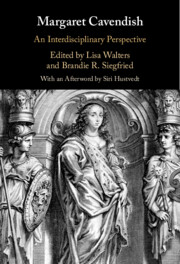Book contents
- Margaret Cavendish
- Margaret Cavendish
- Copyright page
- Contents
- Illustrations
- Notes on Contributors
- In Memoriam
- Acknowledgments
- Introduction
- Part I History of Science
- Part II Philosophy
- Part III Literature
- Part IV Politics
- Part V New Directions
- Afterword
- Chronology of Works by Margaret Cavendish
- Select Bibliography
- Index
Introduction
The Intellectual Span of Margaret Cavendish, Duchess of Newcastle
Published online by Cambridge University Press: 28 April 2022
- Margaret Cavendish
- Margaret Cavendish
- Copyright page
- Contents
- Illustrations
- Notes on Contributors
- In Memoriam
- Acknowledgments
- Introduction
- Part I History of Science
- Part II Philosophy
- Part III Literature
- Part IV Politics
- Part V New Directions
- Afterword
- Chronology of Works by Margaret Cavendish
- Select Bibliography
- Index
Summary
Margaret Cavendish has recently become the subject of intense academic interest among scholars from a wide range of disciplines. In addition, she is increasingly becoming visible in popular culture. In the Introduction of this collection, Brandie R. Siegfried and Lisa Walters explore Cavendish’s influence upon Western philosophy, science, literature and women’s rights. The Introduction also provides contextual information about Cavendish’s life and works and her importance in early modern literary culture as well as the scientific revolution. Indeed, Cavendish is an important figure for understanding the seventeenth century’s collective efforts at advancing knowledge, particularly in philosophy. However, no other natural philosopher of the early modern era developed the sheer breadth of literary versatility and inventiveness peculiar to Cavendish, who explored her philosophy and science in poetry, romance, orations, fictional letters, science fiction, and drama. Hence, this chapter emphasizes the importance of understanding of Cavendish’s diverse and wide-ranging body of thought by situating her ideas within a multidisciplinary conversation among scholars.
Information
- Type
- Chapter
- Information
- Margaret CavendishAn Interdisciplinary Perspective, pp. 1 - 16Publisher: Cambridge University PressPrint publication year: 2022
